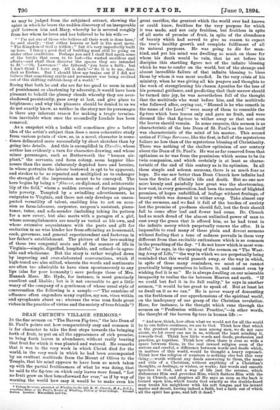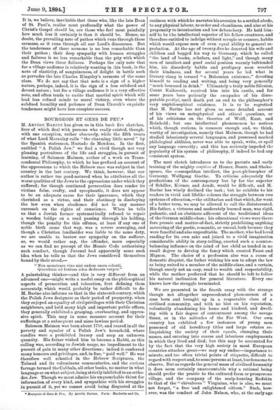DEAN CHURCH'S VILLAGE SERMONS.*
IN the fine sermon on "The Barren Fig-tree," the late Dean of Bt. Paul's points out how comparatively easy and common it is for character to take the first steps towards the bringing forth of fruit, to put on all the appearances of rich promise, to bring forth leaves in abundance, without really bearing that fruit for which it was planted and watered. He remarks that it was in the very week in which Christ died for the world, in the very week in which he had been accompanied by an exultant multitude from the Mount of Olives to the Temple, that his mind appears to have been so much taken up with the partial fruitlessness of what he was doing, that he said to the fig-tree on which only leaves were found, "Let no fruit grow on thee henceforward for ever," as if by way of -warning the world how easy it would be to make even his
Village Sermons preached at Whale,/ by the late E. W. Church, M.A., D.C.L. semetims Dean of St. Paul'e, Rector of Whatley, Feline of Oriel Collage. Second 'rerie& London: Macmillan and Co.
great sacrifice, the greatest which the world ever had known or could know, fruitless for the very purpose for which it was made, and not only fruitless, but fruitless in spite of all sorts of promise of fruit, in spite of the abundance of beauty which had served to give us reason to expect the tree's healthy growth and complete fulfilment of all its natural purposes. He was going to die for man- kind, and yet his mind was dwelling so much on those for whom his death would be vain, that he set before his disciples this startling figure not of the infinite blessing which he was to confer on the world, but of the strange and
almost incredible failure of that infinite blessing to bless those by whom it was most needed. In the very crisis of his ministry, when he was giving all his prayers and thoughts to the work of strengthening his chosen Apostles for the loss of his personal guidance, and predicting that their sorrow should be turned into joy, he was nevertheless full of the thought that the multitude who went before him, and the multitude who followed after, crying out, "Blessed is he who cometh in the name of the Lord !" were many of them to resemble the fig-tree which bore leaves only and gave no fruit, and were doomed like that fig-tree to wither away so that not even the leaves should remain. In some respects, this sermon is as characteristic of the late Dean of St. Paul's as the text itself was characteristic of the mind of his master. This second series of Village Sermons, like the first, is full of the mysterious failure no less than of the mysterious blessing of Christianity. There was nothing of the shallow optimism of our century about the Dean of St. Paul's. He was as far removed from that optimism as he was from the pessimism which seems to be its twin companion, and which certainly is at least as charac- teristic of the end of this century as is its optimism. In all these simple and solemn sermons, there is as much fear as hope. No one saw better than Dean Church how infinite had been the fruits of Christ's life and death. But no one saw more keenly and painfully how great was the shortcoming, how vast, in every generation, had been the number of blighted
promises, of hopes unfulfilled, of leafage without fruitage, of beauty which was doomed to wither away. Take almost any of the sermons, and we find it full of the burden of anxiety lest the promise of goodness should fail, lest the fruit should fail to come after leaf and flower had come. Dr. Church had as much dread of the almost unlimited power of man to cast away the grace that is offered him, as he had trust in the infinite mercy which perpetually renews the offer. It is impossible to read many of these plain and devout sermons without feeling that a tone of sadness prevails in them very different from that excitable enthusiasm which is so common in the preaching of the day. "I do not know which is most won- derful," he says, in the opening of the sermon on "The Wast- ing Away of Life," "the way in which we are perpetually being reminded that this world passeth away, or the way in which, in spite of these many reminders, we most of us cannot practically bring ourselves to believe it, and cannot even by wishing feel it is so." He is always dwelling on our miserable incapacity to realise the tie between Heaven and earth. "If we could but feel it in its full reality," he says in another sermon, "it would be too great to speak of. But at least let us dwell on it as we can." He is never weary of descanting on the feebleness of our apprehensions of the spiritual world, on the inadequacy of our grasp of the Christian revelation.
Here, for instance, is the thought which runs through the sermon on "Profession without Practice,"—in other words, the thought of the barren fig-tree in human life : —
"And now, think, how often what we would not for all the world be to our fellow-creatures, we are to God. Think how that which is the greatest reproach to a man among men, we do not care about, we let every one see in us, without the least minding it, towards God. Think how little words and deeds, profession and practice, go together. Think how often there is ever so wide a space between them, in the real inward religion even of the serious and careful, a difference between words and deeds which, in matters of this world, would be thought a heavy reproach. Think how the religion of numbers is nothing else but this very thing ;—words without any deeds answering to them, the name and title of a Christian, without anything of a Christian's thoughts, or feelings, or wishes, or works; fair words and smooth speeches to God, and a way of life just the reverse, which dishonours Him and provokes Him, which flatters Him with the lips in Church, and despises all He says as soon as the back is turned upon him, which treats God exactly as the double-fazed man treats his neighbour with his soft tongue and his inward malice and deceit, having indeed. a faith, but a faith out of which all the spirit has gone, and left it dead."
It is, we believe, inevitable that those who, like the late Dean of St. Paul's, realise most profoundly what the power of Christ's Gospel should be, are those who feel most painfully how much less it certainly is than it should be. Hence, no doubt, the prevailing note of pathos which runs through these sermons, as it runs through all our Lord's discourses. But the tenderness of these sermons is no less remarkable than their pathos ; their deep sympathy with human struggles and failures is no less remarkable than the pity with which the Dean views those failures. Perhaps the only note that for a village audience is relatively wanting in this book, is the note of elasticity, of sanguineness, of delight in battle such as pervades the late Charles Kingsley's sermons of the same class. We do not say that that note is a sign of a higher nature, perhaps, indeed, it is the sign of a less subdued and devout nature ; but for a village audience it is a very effective note, and often tends to excite that martial spirit which will lead less refined minds to moral victory, even where the subdued humility and patience of Dean Church's exquisite tenderness might have less complete success.







































 Previous page
Previous page